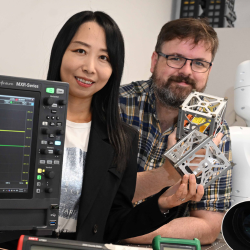-
Study
-
Undergraduate
- Search for a Course
- Undergraduate Open Day & Events
- Application Guides
- Northumbria University UCAS Exhibitions
- Foundation Years
- Undergraduate Fees & Funding
- School & College Outreach
- Continuing Professional Development
-
Postgraduate
- Postgraduate Study Degree
- Postgraduate Research Degrees
- Postgraduate Open Days and Events
- Postgraduate Fees & Funding
- Flexible Learning
- Thinking about a Masters?
- Continuing Professional Development
- Change Direction
-
Student Life
- The Hub - Student Blog
- Accommodation
- Life in Newcastle
- Support for Students
- Careers
- Information for Parents
- Students' Union
- Northumbria Sport
- Be Part of It
-
-
International
International
Northumbria’s global footprint touches every continent across the world, through our global partnerships across 17 institutions in 10 countries, to our 277,000 strong alumni community and 150 recruitment partners – we prepare our students for the challenges of tomorrow. Discover more about how to join Northumbria’s global family or our partnerships.
View our Global Footprint-
Applying to Northumbria
- European Union
- Our London Campus
- Northumbria Pathway
- International Events
- Entry Requirements and Country Representatives
- Regional Offices
-
Northumbria Language Centre
- Faculty Requirements
- Acceptable English Requirements
- Pre-sessional English Language and Study Skills
- Academic Language Skills Programmes (ALS)
-
International Fees, Funding & Scholarships
- International Undergraduate Fees
- International Undergraduate Funding
- International Masters Fees
- International Masters Funding
- International Postgraduate Research Fees
- International Postgraduate Research Funding
- International Money Matters
-
Life at Northumbria
- International student support
- Careers
-
International Mobility
- Current Northumbria Students
- Incoming Exchange Students
-
-
Business
Business
The world is changing faster than ever before. The future is there to be won by organisations who find ways to turn today's possibilities into tomorrows competitive edge. In a connected world, collaboration can be the key to success.
More on our Business Services -
Research
Research
Northumbria is a research-rich, business-focused, professional university with a global reputation for academic quality. We conduct ground-breaking research that is responsive to the science & technology, health & well being, economic and social and arts & cultural needs for the communities
Discover more about our Research -
About Us
-
About Northumbria
- Our Strategy
- Our Staff
- Place and Partnerships
- Student Profiles
- Alumni Profiles
- Leadership & Governance
- Academic Departments
- University Services
- History of Northumbria
- Contact us
- Online Shop
-
-
Alumni
Alumni
Northumbria University is renowned for the calibre of its business-ready graduates. Our alumni network has over 244,000 graduates based in 178 countries worldwide in a range of sectors, our alumni are making a real impact on the world.
Our Alumni - Work For Us
What will I learn on this module?
This course provides you with conceptual and practical tools for analysing and evaluating collaborative arrangements for sustainability involving private and public sector organizations and civil society. Academic research and real-life examples will be studied through invited keynote speakers, business cases, role-plays and mini-research projects. You will also conduct a team-based project to launch a partnership yourself that addresses an issue of concern (e.g. litter in your neighbourhood). This learning-by-doing component of the course will allow you to experience the role of network orchestrator in governing partnerships and gain the necessary skills and capabilities in orchestration work. On-line and face-to-face project tutorials will support your learning and assignment preparation during this project.
Topics that will covered in this course include the drivers behind collaborative arrangements to address sustainability challenges, the different types of partnerships and collaborations, the different motivations of participating actors and the inherent tensions involved when collaborating with multiple actors from different societal sectors and the need to govern these tensions through network orchestration if the collaboration is to create value and facilitate private value capture.
How will I learn on this module?
While the overarching format for the course is active learning, part of this module will be theory-based, and the other part will be practice-based.
In the first 7 weeks, students will engage in active learning using the academic literature, business cases, and real-world examples of collaborative arrangements for sustainability. This module uses flipped classroom principles which requires you to read and prepare the assigned readings for lectures. The lectures are largely seminar-like discussions between the students and lecturer. Practitioners might be invited to share their experiences with the topic discussed. The tutorial hours require you to actively engage in learning activities with groups of students where you apply theoretical knowledge. Examples of such in-class exercises are role-plays, business cases and mini-research projects (e.g. coding of websites). You will present informally your group work at the end of each lecture and these exercises are part of your individual Portfolio.
In the second part of the course (from lecture 7 to lecture 12), students will collaborate in small groups to (a) identify a real-life sustainability challenge on campus, in their household/community or neighbourhood that requires collaborative action to be addressed and (b) mobilize the stakeholders into a collaboration for sustainability. In doing so, they will thus put the theories, concepts and tools on collaborative action into action. Thus, this half of the module is based on students’ practical engagement with a sustainability challenge and its stakeholder. This experiential learning will culminate in 15 minutes in-class Presentation. Reflection on your role within and contribution to this group activity and the significance of network orchestration for collaboration and achieving common goals is to be included in your individual Portfolio.
Please note that, for both parts, self-study is integral to student success. This includes preparation before and after class sessions by reading course material, doing assignments provided by the lecturers and working on group projects. Recommended and required reading and viewing will be specified in the lesson plans. Materials used will either be freely available on the internet, library or provided by your lecturers.
The format of the course is the following:
Weeks 1 - 7
Each weekly seminar period will consist of (a) teacher-led discussions on the assigned readings and (b) an in-class exercise to put the theory into practice.
Weeks 7 - 12
These weeks will involve intensive group work on launching a collaboration for sustainability. Groups will meet with course coaches on-line and face-to-face once per week in the normally scheduled timeslot to engage in designing and reflecting on their orchestration work to advance their collaboration for sustainability. In these sessions student groups will also provide updates, get feedback, resolve issues, and set weekly goals.
How will I be supported academically on this module?
Your learning is supported by a Teaching and Learning Plan that includes directed learning and outlines the content of weekly lectures and seminars. All readings and other supporting materials are provided through the Blackboard E-Learning portal. Your independent learning should combine deeper and broader reading in areas of particular relevance to the subject of your assignment. The weekly readings will be supplemented by guidance on further reading to facilitate this.
Lecturers will be available for student questions throughout the module (each lecturer will specify his/her availability). They will provide ongoing formative feedback in seminars, especially in relation to your understanding of conceptual and theoretical material.
What will I be expected to read on this module?
All modules at Northumbria include a range of reading materials that students are expected to engage with. Online reading lists (provided after enrolment) give you access to your reading material for your modules. The Library works in partnership with your module tutors to ensure you have access to the material that you need.
What will I be expected to achieve?
N/A
How will I be assessed?
N/A
Pre-requisite(s)
N/A
Co-requisite(s)
N/A
Module abstract
Organising for transitions necessitates a long-term focus on sustainable development and an understanding of the complexity and persistence of economic and social challenges that requires resources, skills and knowledge beyond any one organisation or firm. Grand challenges like climate change and social inequality have raised questions about the viability of established business practices leading to calls for more innovative ways of leading and managing within and across organisations and sectors. This module focuses on some of the theoretical and practical considerations for corporate sustainability and transition, including new networked models of collaboration and governance, leadership and learning for organising and managing transitions. On completing this module, you will have acquired an overview of the different collaborative arrangements in which companies participate, the drivers for their emergence, the dynamics in their establishment and governance and will have gained essential collaboration management and leadership skills that are imperative for 21st century careers.
Course info
Credits 20
Level of Study Postgraduate
Mode of Study 18 months Full Time
Department Newcastle Business School
Start August 2026
All information is accurate at the time of sharing.
Full time Courses are primarily delivered via on-campus face to face learning but could include elements of online learning. Most courses run as planned and as promoted on our website and via our marketing materials, but if there are any substantial changes (as determined by the Competition and Markets Authority) to a course or there is the potential that course may be withdrawn, we will notify all affected applicants as soon as possible with advice and guidance regarding their options. It is also important to be aware that optional modules listed on course pages may be subject to change depending on uptake numbers each year.
Contact time is subject to increase or decrease in line with possible restrictions imposed by the government or the University in the interest of maintaining the health and safety and wellbeing of students, staff, and visitors if this is deemed necessary in future.
Useful Links
Find out about our distinctive approach at
www.northumbria.ac.uk/exp
Admissions Terms and Conditions
northumbria.ac.uk/terms
Fees and Funding
northumbria.ac.uk/fees
Admissions Policy
northumbria.ac.uk/adpolicy
Admissions Complaints Policy
northumbria.ac.uk/complaints














